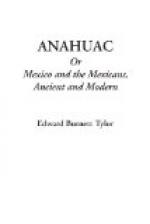We rode back through the woods to Guajalote, where the Mexican cook had made us a feast after the manner of the country, and from her experience of foreigners had learnt to temper the chile to our susceptible throats. Decidedly the Mexicans are not without ideas in the matter of cookery. We stayed talking with the hospitable Don Alejandro and his sister till it was all but dark, and then rode back to the Real, admiring the fire-flies that were darting about by thousands, and listening to our companion’s stories, which turned on robberies and murders—–as stories are apt to do in wild places after dark. But, save an escape from being robbed some twenty years back, and the history of an Indian who was murdered just here by some of his own people, for a few shillings he was taking home, our friend had not much reason to give for the two huge horse-pistols ho carried, ready for action. His story of the death of a German engineer in these parts is worth recording here. He was riding home one dark night, with a companion; and, trusting to his knowledge of the country, tried a short cut through the woods, among the old open mines near the Regla road. They had quite passed all the dangerous places, he thought, so he gave his horse the spur, and plunged sheer down a shaft, hundreds of feet deep. His friend pulled up in time, and got home safely.
We had one more day among the mines, and then went back to Pachuca, and next day to Mexico in the Diligence. Everywhere the same hospitality and good-natured interest in us and our doings, often shown by people with whom we had hardly the slightest acquaintance. Travelling here is very different from what it is in a country on which the shadow of Murray’s Handbook has fallen.
Almost all the interest Europe takes in Mexico, politically and commercially, turns upon the exportation of silver. The gold, cochineal, and vanilla are of small account. It is the silver dollars that pay for the Manchester goods, woollens, hardware, and many other things—those ubiquitous boxes of sardines a l’huile, for instance. The Mexicans send to Europe some five millions sterling in silver every year, that is, about twelve shillings apiece for all the population. It is just about what their government spends annually in promoting the maladministration of the country (and, looking at the matter in that point of view, they don’t do their work badly for the money). The income of the Mexican church is not quite so much, but not far off.
Baron Humboldt has expressed a hope that, at some future day, the Mexicans will turn their attention to producing articles of real intrinsic value, and not those which are merely a sign to represent it. He tells us, quite feelingly, how the Peace of Amiens stopped the working of the iron-mines that had been opened when they could get no iron from abroad; for, when trade was reopened, people preferred buying in Europe probably a better article at one-third the price.




